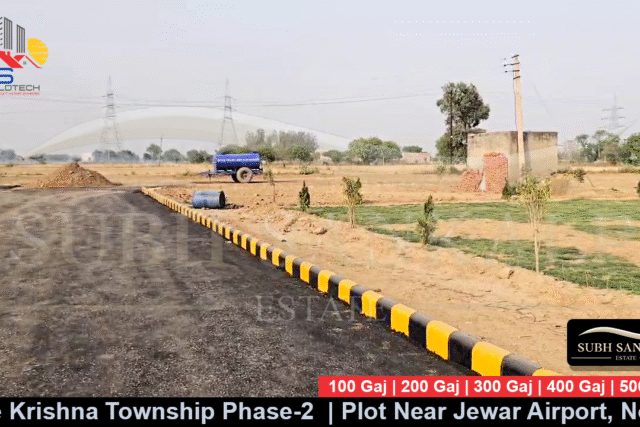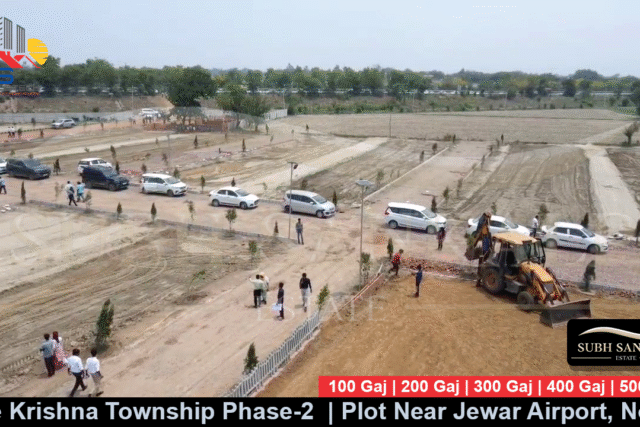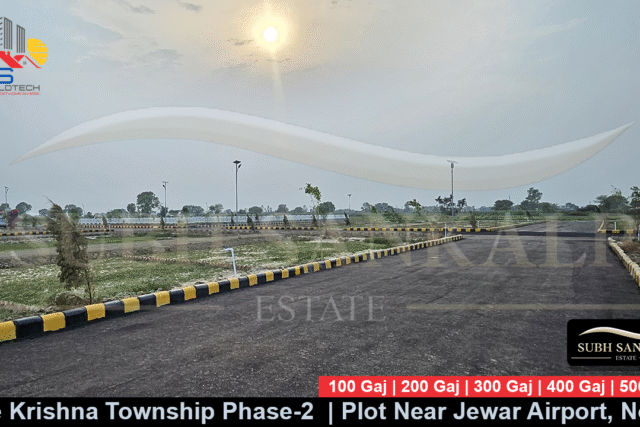The development of the Noida International Airport has initiated one of North India’s most significant urban transformations, creating exceptional opportunities for township-scale land investments. Within this rapidly evolving landscape, 1500 Gaj Buy Plot Near Jewar Airport – Hare Krishna Township Phase 2 represent the ultimate tier of land banking, offering the scale and strategic positioning for creating self-sustained developments that will shape the region’s urban fabric for decades to come.
Transformative Development Potential
A 1500 Gaj plot, equivalent to 13,500 square feet, provides the critical mass for institutional-grade development projects that transcend conventional real estate paradigms. This substantial footprint enables:
Comprehensive Township Development
- Self-contained residential communities with extensive amenity portfolios
- Integrated mixed-use developments combining retail, commercial, and residential components
- Corporate campuses with training facilities and accommodation
- Specialized institutional facilities for education and healthcare
- Premium hospitality projects leveraging airport proximity
Urban Infrastructure Creation
- Internal road networks and utility systems
- Green spaces and recreational facilities
- Community centers and social infrastructure
- Sustainable development features and smart city solutions
Strategic Aerotropolis Positioning
The airport corridor represents a sophisticated economic ecosystem characterized by:
Infrastructure Advantage
- Multi-modal connectivity including Yamuna Expressway access
- Proposed metro rail and rapid transport systems
- Enhanced utility networks serving large-scale developments
- Strategic position in government development priorities
Economic Diversification
- Beyond aviation operations, attracting logistics and commercial hubs
- Emerging as a premium residential and institutional corridor
- Growing presence of corporate and industrial facilities
- Development of supporting social infrastructure
Investment Framework
Location Evaluation Matrix
- Master plan alignment and development regulations
- Connectivity to transportation networks and airport access
- Utility capacity and service reliability for large projects
- Surrounding development quality and growth momentum
- Environmental considerations and regulatory constraints
Development Planning Strategy
- Market-responsive project conceptualization and positioning
- Phased implementation and capital deployment strategies
- Regulatory compliance and approval management
- Sustainability integration and quality standards
Financial Structuring
- Capital planning for township-scale projects
- Development cost modeling and control mechanisms
- Revenue planning and cash flow management
- Risk assessment and mitigation frameworks
Implementation Excellence
Project Management
- Professional systems for large-scale development execution
- Quality assurance and control protocols
- Supply chain management for premium materials
- Coordination of sales, marketing, and construction activities
Stakeholder Management
- Regulatory authority engagement and compliance
- Community relations and impact assessment
- Investor communications and reporting
- Vendor and partner management
1. What is the investment scale required for 1500 Gaj plots in premium locations?
Township-scale plots command significant capital commitments, with prime locations requiring substantial investment. Valuations reflect both land scarcity and transformational development potential, typically requiring sophisticated capital partnership structures and institutional funding arrangements.
2. What specialized approvals are necessary for township-scale developments?
Large-scale projects require comprehensive approvals including environmental impact assessments, traffic and transportation studies, height and density clearances, and specific permits for mixed-use components and amenities. The process involves multiple regulatory bodies and detailed compliance requirements.
3. How does the development timeline differ for 1500 Gaj plots?
Township-scale projects involve extended timelines of 5-8 years due to complex master planning, multi-phase regulatory approvals, sophisticated infrastructure development, and comprehensive marketing campaigns for large inventory absorption across different project phases.
4. What are the primary market segments for township-scale developments?
Core demand comes from corporate entities seeking integrated campuses, institutional investors targeting managed township projects, high-net-worth individuals, and specialty operators in education, healthcare, and hospitality sectors seeking scale advantages.
5. What professional expertise is essential for successful execution?
Critical capabilities include proven experience with township-scale projects, financial management for long-gestation investments, technical expertise in sustainable urban development, established quality standards, and demonstrated regulatory compliance capabilities across multiple jurisdictions.















Leave a review for 1500 Gaj Buy Plot Near Jewar Airport – Hare Krishna Township Phase 2